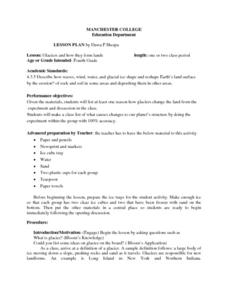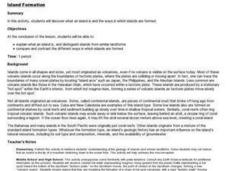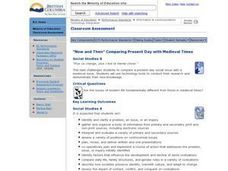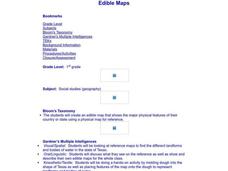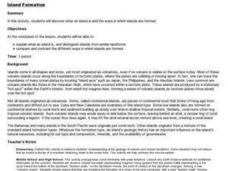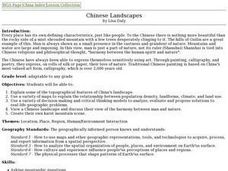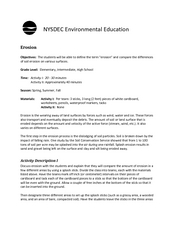Curated OER
I Love the Mountains
First graders discuss and define different landforms. They read the book "Our Land", sing a landform song and perform it with motions and then complete a worksheet.
Curated OER
Glaciers and How They Form lands
As a whole class, the students define glacier and perform an experiment involving glaciers. The students brainstorm ideas of what a glacier is, and narrow the ideas down to a definition. The students then participate in an activity that...
Curated OER
Layer By Layer
Have your class learn about the formation of the Grand Canyon using this lesson plan. After listening to a variety of stories about the Grand Canyon and erosion, learners complete worksheets related to the geology of this area. What a...
Curated OER
The Geography - Writing Connection
Pupils examine and describe the four physical systems of the Earth. Using two of the systems, they practice their writing skills and use vocabulary associated with the different types of landforms. They predict the types of shelters are...
Curated OER
"What If The Earth Were Made Of Sand
Young scholars examine the most common characteristics of clay and sand, and to understand how the properties of these materials affect the erosion of the landscape and the formation of the many landforms. They explore clay and sand...
Curated OER
Island formation
Students explain what an island is, and distinguish islands from similar landforms. They compare and contrast the different ways in which islands are formed.
Curated OER
Go Glacier Go!
Students create a model of a glacier and observe how it moves. In this landforms lesson plan, students learn what a glacier is, build a model glacier and observe how it moves in a manner that more closely resembles a liquid than a solid.
Curated OER
"Now and Then" Comparing Present Day with Medieval Times
Eighth graders compare a present-day social issue with a medieval issue. They use technology tools to conduct their research and demonstrate their new knowledge. Students present their findings to the class in the form of a PowerPoint.
Curated OER
Edible Maps
First graders, in groups, identify major geographical features of Texas. They form a topographical map of Texas using edible dough, candy, etc. They present and then eat their maps.
Curated OER
Metropolitan Areas in the USA
Fifth graders explore why people live in certain regions of the United States. They investigate information on specific metropolitan areas such as temperature, population, natural resources, precipitation and landforms. In groups, 5th...
Curated OER
"Tri-County" Project--Ground Water
Students explore data on some of the landforms in Nebraska to distinguish between porous and nonpremeable soils. The state's groundwater is investigated.
Curated OER
Aqualung , the New Age Garden
Students examine how underwater landscape could be used for food production in the future. They discuss underwater landforms, draw a picture of an underwater landscape and a type of technology to use underwater, and write a description...
Curated OER
Island Formation
Students create models of how islands are formed by hot spots and then write a summary of their observations and of how they think their model relates to volcanic hot spots and island formation.
Curated OER
Crater Creation
Students examine the Oregon state quarter and discuss how Crater Lake was formed-geologically and according to Native American legend. They practice making predictions and identifying the beginning, middle, and end of a story.
Curated OER
Watersheds:Stream Channels And Post-fire Stream Flows
Learners draw cross sections of a stream channel from field data. In the field, using a GPS, they determine the depth of a stream channel and use a spreadsheet to graph the stream channel.
Indian Land Tenure Foundation
Relationships to Places
Young historians take a look at how the Indian tribes of California promoted a mindful relationship between people and the land. They begin to understand how the Indians were champions of conservation, and at preserving the natural...
Curated OER
Chinese Landscapes
Learners explain some of the topographical features of China's landscape. They view a Chinese landscape and discuss their view of the harmony between man and nature, then create their own karst mountain scene.
Curated OER
Archaeological Soils
Young scholars evaluate how archaeologists use soils to interpret sites and determine components of a soil sample.
Curated OER
Weathering and Erosion
Students conduct two experiments. In this weathering and erosion lesson, students identify the different ways that weathering occurs, name the natural elements of weather and explain the process of erosion. Students watch a PowerPoint on...
Curated OER
Erosion
Students study various types of erosion. The purpose of these activities is to increase students awareness to the point where they can make intelligent decisions on proper land use.
Curated OER
A Rocky Situation
Second graders conduct experiments with rocks to observe weathering. They read books, examine websites and watch a video to examine how rocks break down into soil.
Curated OER
Landform Dictionary
Third graders use a word processing program to create a working dictionary, including definitions and pictures, of physical land forms used in the study of different regions of the world.


